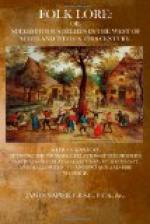There were other practices and notions appertaining to the spittle and spitting, some of which continue to this day. To spit for luck upon the first coin earned or gained by trading, before putting it into the pocket or purse, is a common practice. To spit in your hand before grasping the hand of a person with whom you are dealing, and whose offer you accept, is held to clinch the bargain, and make it binding on both sides. This is a very old custom. Captain Burt, in his letters, says that when in a bargain between two Highlanders, each of them wets the ball of his thumb with his mouth, and then they press their wet thumb balls together, it is esteemed a very binding bargain. Children in their games, which are often imitations of the practices of men, make use of the spittle. When playing at games of chance, such as odds or evens, something or nothing, etc., before the player ventures his guess he consults an augury, of a sort, by spitting on the back of his hand, and striking the spittle with his mid-finger, watching the direction in which the superfluous spittle flies, from him or to him, to right or left, and therefrom, by a rule of his own, he determines what shall be his guess. Again, boys often bind one another to a bargain or promise by a sort of oath, which is completed by spitting. It runs thus:
“Chaps ye, chaps ye,
Double, double daps ye,
Fire aboon, fire below,
Fire on every side o’
ye.”
After saying this, the boy spits over his head three times, and without this the oath is not considered binding; but when properly done, and the promise not fulfilled, the defaulter is regarded as a liar, and is kept for a time at an outside by his companions.
When two boys made an arrangement (I am speaking of what was the custom fifty years back), either to meet together at a stated time or to do some certain thing, the arrangement was confirmed by each spitting on the ground.




